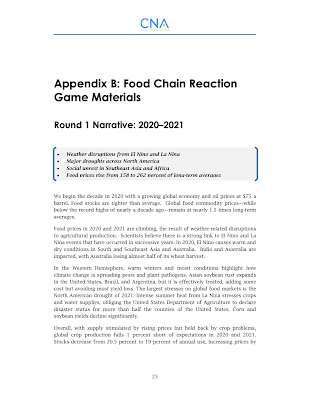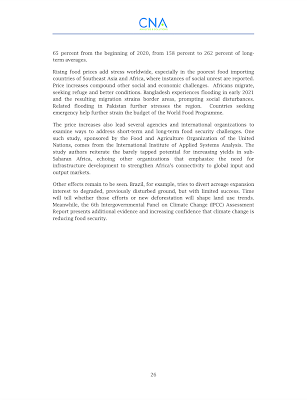Over the past six months, the narrative being perpetuated by the global ruling class has shifted from the pandemic to the fight against global climate change, often through the use of carbon taxes, the ongoing conflict in Ukraine and its inflationary impact on households around the world. As was the case with the Event 201 simulation which took place prior to the declaration of the pandemic, a similar simulation called the "Food Chain Reaction" took place back in 2015 as shown here:
...which included participation from the Center for American Progress, the World Wildlife Fund, Cargill, Mars and the Center for Naval Analysis (CNA), a federally funded research and development centre whose analyses are used to inform the decisions of the United States Department of Defense leadership. It also included senior officials and experts from Brazil, Africa, China, the European Union, India, the United States as well as various multilateral institutions, businesses and investors.
This decision making game was developed to explore issues arising from global food system disruptions spanning the decade from 2020 to 2030. The game considered the impact of population growth, urbanization, severe weather and social unrest on the global food system. Here is a quote from the publication as found on CNA's website about the setting for the game:
"The game was set between the years 2020 and 2030, a period that was near enough to be familiar, but distant enough to allow players to focus beyond current policy debates. The longitudinal nature of the game presented players with the opportunity to realize the impacts of their choices in the context of the environment-food- stability nexus. The players were organized into eight teams. Six of the teams represented Brazil, China, the European Union (EU), India, the United States, and Continental Africa. The seventh team represented Business and Investors, and the eighth team represented Multilateral Institutions (e.g., World Bank, United Nations, Non-Governmental Organizations). The interests of and events in other key regions, such as the Middle East and Central Asia, were represented within the underlying background scenario and through events that emerged as the game proceeded."
The game took place over four rounds which allowed the participants to understand the longitudinal impacts of their decisions:
"Prior to the start of the game (through 2019), demographic changes, climate pressures, and political crises had combined to threaten food security. The first round spanning 2020 – 2021, included lower than average global foods stocks, rising food prices, weather-related disasters, and instances of social unrest. The cumulative actions of players influenced worldwide conditions in subsequent rounds. In the second round spanning 2022 - 2024, players experienced the game’s food security crisis peak, followed by a tempering of global pressures in round three (2025 – 2027). The fourth and final round concluded in 2030 and brought players full circle to increasingly tight global circumstances, similar to those in the first round."
Here is a video that was used to set the stage for the gameplayers:
Here is an additional video which briefly outlines the game:
One of the issues facing the participants was the level of conflict within each of the eight geographic teams. The teams from Brazil, China and the United States faced little internal conflict since their approach had consistent viewpoints whereas those from Africa and the European Union experienced considerable internal debate due to the geographic and political heterogeneity within the team.
The participants' actions reflected the feedback loop between climate and food security, noting that agricultural production can contribute to negative environmental issues at the same time as it is the first sector to experience the impact of environmental degradation. Here is how the players solved that issue:
"Recognizing the potentially destructive nature of this feedback loop, players looked to increase agricultural productivity through sustainable and climate-smart practices. In addition, teams agreed to price environmental services, price carbon, support the development of a market for carbon trading, and cap global emissions levels. Teams entered into negotiations regarding a global carbon cap, carbon taxes, carbon “shadow pricing” through regulations, and carbon trading early in the game, but did not agree on implementation actions."
And, there you go, implementing a carbon tax scheme to ensure sustainable agricultural productivity.
Given the current agriculturally-led demonstrations in Europe, particularly the Netherlands, this is a key acknowledgment by the players:
"As the game advanced, teams confronted a “new normal” characterized to a large degree by volatility and uncertainty. In this environment, players acknowledged the link between food insecurity and instability. Food insecurity and increasing numbers of refugees may give rise to an increase in conflict and even illegal (e.g., human trafficking) and/or terrorist actions."
So, how do we solve the issues facing the "new normal" of a more volatile world? Here are their solutions:
"1.) Strengthening existing institutions and authorities under the United Nations (e.g., the World Food Programme, the World Health Organization, the Food and Agriculture Organization, the Department of Peacekeeping Operations, the Office of the High Commissioner for Refugees, and the International Fund for Agricultural Development) and developing better coordination among them.
2.) Establishing a new coordinating entity under the United Nations/G20 to create the capacity to respond in a more timely way.
3.) Creating a new Strategic Headquarters under the United Nations to better coordinate member states’ use of military and nonmilitary assets, and to pre- position materials in areas of anticipated need.
...all of which will be funded using a modest transaction fee on global carbon trading along with additional funding commitments from China. Given the United Nations (and its affiliated NGOs) track record for ineptitude when it comes to global issues, this is hardly a reassuring recommendation.
For your information, here are the Food Chain Reaction game materials which provide details on each of the four rounds of the game:
Let's close with these February 2016 comments from Cargill's President and CEO, David W. MacLennan after the game was completed, keeping in mind that Mighty Earth rated Cargill as the world's worst company when it comes to its corporate environmental and social behaviour as shown here:
"At Cargill, we have been managing volatility for more than 150 years. As commodity traders, we see how fluctuations in one area have follow-on effects in others.
Because our food, water and energy systems are inextricably linked, disruptions in one unleash a cascade of consequences in the others.
Those consequences can extend beyond the food system and become triggers for economic and political instability and civil unrest. For example:
In 2010: Russia experienced a heat wave that saw the highest temperatures in 130 years.
The heat wave reduced Russia’s wheat crop by one-third.
Russia instituted ban; impacted prices
2 percent change in global wheat supply drove a nearly 60 percent increase in prices around the world.
At the time, Russia supplied Egypt with the majority of its wheat. The rapid shift in supply led to price increases, and when combined with broader political tensions, were a contributing factor to the 2011 protests in Tahrir Square.
Similar scenarios have played out in Syria and some 60 other countries in the last decade.
In very real terms food security, climate and political stability are linked.
Behind the headlines there is a simple truth: Producing food is an outdoor activity and climate change is making challenging work of feeding a growing population.
But given that no one in this room tonight is in much danger of missing a meal, why should we care?
Three reasons:
First, disruptions in the global food system can trigger bigger problems that can have socioeconomic consequences that will hit us here at home.
Second, the world is having a new conversation about the food we eat. Here and in other high-income countries we care about gluten-free, sugar, GMO labeling and more. In low-income countries, we are also focused on nutrition – that’s why in India we have started fortifying cooking oil with vitamins A and D. Around the world, Cargill is working with its customers to respond to consumer preferences, reformulate products and explore new ingredients.
Finally, the private sector can, and must play a role in making the global food system more sustainable and resilient. We know that that climate, land, water and farmer livelihoods are all a part of the food security equation."
It's fascinating to see how the global elites have invoked global climate change as a means to further impoverish the organ donor class through the imposition of further carbon taxes as one of the key solutions to solving potential food production shortages while adding to their own personal wealth at the same time as the serfs suffer from extremely high food price inflation as shown here:
We all know that the global agribusiness sector is all about profitability and personal wealth and has little to do with environmental and social responsibility. If we starve or can't afford food or suffer from food insecurity, that's our problem.
















No comments:
Post a Comment